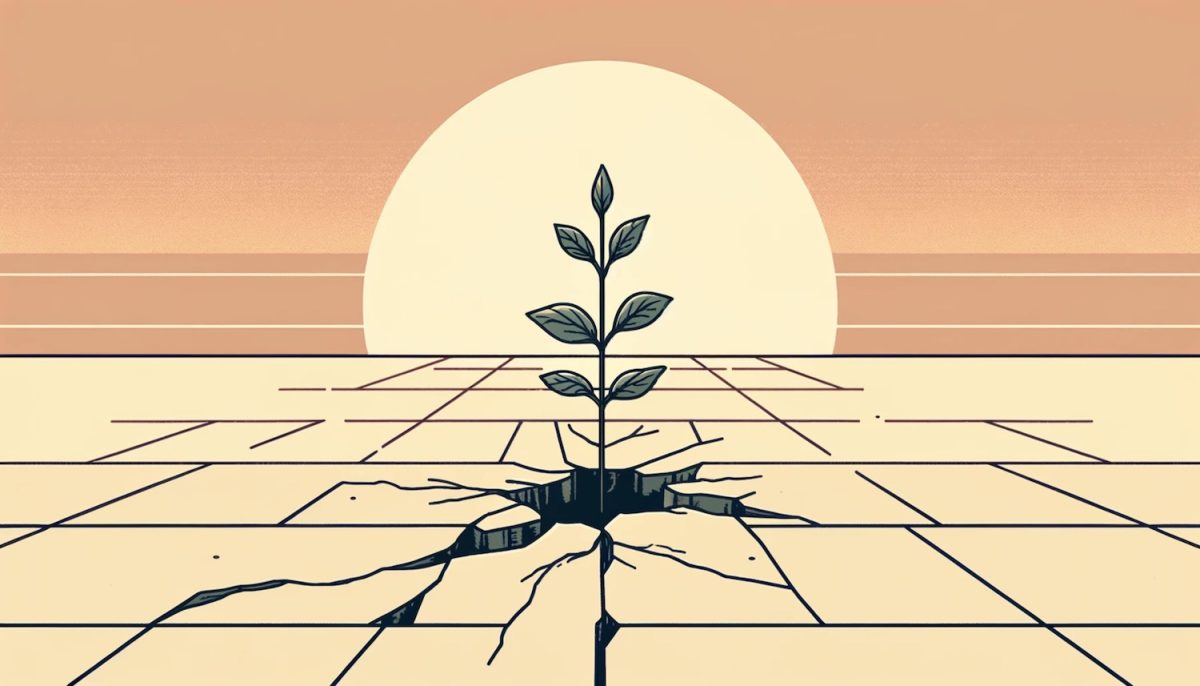This was an incredible question from someone in the JKL Community.
“What is Post traumatic growth? How does one transition out of survival mode?”
In education there is an important term called “trauma informed teaching”.
The concept is simple, teach in a way that is compassionate to people who may have experienced trauma, so as to not make it worse.
It’s always best to err on the side of caution when teaching, or coaching anyone.
You don’t know what they’ve been through.
And honestly what may be triggering to one person can be very different than someone else.
Trauma Is An Individual Experience

Over the course of my career I’ve become really interested in just how much of an individual difference trauma can play.
In some cases in a negative, quote unquote, “bad” way.
But in many cases in a positive, “good” way as well.
It’s a lot like the topic of pain.
It’s so individualized that it’s almost confusing, but certainly interesting.
For example I have met students whose parents were a bit mean to them and their lives were ruined by it.
I’ve also met students who have had such terrible experiences, things that if I described would sound like the plot of a horror movie.
Like really, really bad and found themselves on death’s door many times with a ton of terrible adverse experiences.
And yet in some cases, people like this have gone on to write about their trauma and build badass businesses and beautiful families as a way to channel their energy
Point is, we all heal according to a unique time and plan.
The fun thing that I want to point out about this today is that it’s possible to go well beyond surviving to thriving.
Along a healing journey, no matter how terrible your circumstances, you might find some positive changes.
Can You Choose Vitality?
We may not be able to outright choose our emotions.
Our thoughts and feelings stem from a long history of how we react to different situations.
But what is reassuring is understanding that it IS POSSIBLE for anyone to live with vitality.
If you haven’t read “Man’s Search For Meaning” I mean it’s the absolute most incredible book when it comes to this concept.
Aside from personal stories I know from clients, this book was the most impactful and clear for me about the mind’s ability to thrive through difficulty.
Here’s a quote from the author Viktor Frankl about his finding happiness amidst the chaos of living in concentration camps:
“Everything can be taken from a man but one thing: the last of the human freedoms—to choose one’s attitude in any given set of circumstances, to choose one’s own way. When we are no longer able to change a situation, we are challenged to change ourselves.”
I wanna tackle specifics about what you can do to make growth a real possibility and give some idea of where this research comes from, but first I want to point out that the examples I’ve shared so far are about the extreme, massive external traumas, things that happen to us that are unbelievable and near unbearable.
But the important thing is that this applies also to our day to day, to the struggles every one of us face year over year at any given moment as a result of the suffering and adversity that can come from simply being human.
What Is Post Traumatic growth?

There’s actually a term for this. “Post-Traumatic Growth (PTG)”.
The PTG theory was developed in the 90’s by Richard Tedeschi and Lawrence Calhoun.
The theory states that following adversity or crisis, people often see positive growth.
The crisis is a permanent defining moment that creates a ‘psychological earthquake’ where your world is now divided between before it happened, and after it happened.
Stronger Than Before
Come to think of it, when I reflect on the death of my younger brothers within a year of each other, I do feel a very distinct before and after.
And it’s like the more time that goes on the more I feel like I am an increasingly different person than I was before.
But another personal connection to the positive, is the idea of breaking bones.
I’ve broken a few bones in my day and each of those breaks is actually stronger than it was before
Did you know bones grow back stronger than before?
Understanding this PTG stuff is like owning a silver lining’s playbook.
The playbook gives us insight into what areas of life can actually grow back stronger than before.
And there are a few strategies to make it even more likely that they do grow back stronger than before.
What Is Trauma?
If we’re gonna talk about growing stronger after, then we should first clarify what trauma is.
This is what a quick online search revealed:
Deeply emotional, psychological, and physical responses that a person may experience following events that are highly stressful, disturbing, frightening, or distressing.
Such events can be singular occurrences, like a natural disaster, serious accident, act of violence, loss, or they can stem from ongoing circumstances, such as chronic illness, abuse, or conflict.
Trauma can lead to a wide range of emotional, psychological, and physical symptoms. And its impact varies greatly among individuals.
I love the important point that Dr. Gabor Mate shares about our misunderstanding of trauma:
Trauma is not what happens to you. It is the invisible force that shapes your life. It shapes the way you live, the way you love and the way you make sense of the world. It is the root of your deepest wounds. Trauma is often the source of troubling behaviors and diseases. But it’s not the act itself that you have experienced. It is not what happened to you. Rather, it is what happens inside of you as a result of what happened to you. The way that your mind, body and spirit are damaged by your experiences.
Aright, so how the heck do all of these formal, very heavy, language based descriptions help us in the real world?
A Common Sense Approach To Post Traumatic Growth
We could have all of the definitions in the world, but understanding what that actually means to you, in practical terms is what really matters.
Regardless of what “happened to us” it has been proven time and time again, from clients of mine, or famous examples like Viktor Frankl, that we don’t simply survive.
Of course surviving is the very first step. Maybe the most important one. Live to play another day.
But after we survive it is possible to thrive.
It’s not about returning to a baseline level.
It can be about experiencing profound changes.
To rise like the Phoenix of your personal development, emerging stronger, wiser, more resilient.

Factors For Post Traumatic Growth
Now as complex as growing from trauma can be, there are specific factors that help us.
Interestingly these factors also improve as a result of our growth.
They become a flywheel for each other. The more momentum you put into these areas, the more you grow and the more you grow the more you can put energy into these areas.
Tedeschi and Calhoun share “The Five Key Dimensions of Posttraumatic Growth”.
The specific five positive psychological changes we can experience as a result of adversity and struggle. They include:
Appreciation of Life – Not taking things for granted.
Relationships with Others – Increased compassion, connection and empathy.
New Possibilities – Seeing new paths and opportunities.
Personal Strength – Feeling more resilient.
Spiritual Change – Deepening of beliefs in the universe, faith and spirituality.
Just knowing that this is a real possibility for you in recovery from your struggles has a big impact in itself.
But the sad reality is that the opposite result could come true as well.
In all five areas we could have negative effects.
So knowing some tips on giving yourself the best possible chance of a positive transition out of survival mode can be really helpful.
Transitioning Out of Survival Mode
Like everything in life this is a super personal journey. It will look different for everyone.
But also like everything in life, there are themes that connect those who thrive instead of survive.
Remember, we all work at our own pace. If you haven’t seen signs of this on your healing journey, that’s OK. It may come later on.
But here are a few strategies that tend to help, rather than hurt this process:
Mindful Acceptance: Healing takes time. Remember, it’s a mountain and there is a lot beyond your control. But all you have to do is take one step at a time, at this very moment.
Seeking Support: Therapy, support groups, and meaningful relationships, can offer invaluable shared experiences and comfort.
Self-Compassion: Getting better and better at meditation and personal forgiveness can help you replace feelings of external overwhelm with internal positive energy.
Finding Meaning: Focusing on things you find truly most important. Actively searching for purpose in your work can lead to significant insights and energy.
Small Steps: Making small but meaningful progress can rebuild a sense of control and consistency. May be as simple as engaging in a daily self-care activity or atomic habit toward a bigger vision.
Cultivating Optimism: Shift attention from what has been lost to what remains, what you can regain and how you can lead the way in building.
Embracing Ups And Downs: The journey is never linear. There will be challenges and setbacks. But if you zoom out, just like a stock that goes up and down, over time you will be on the way up.
Looking Forward
I started writing this simply to answer such a thoughtful question.
But I found myself making deep connections to my own life and the life of many clients.
I hope sharing this exploration of post-traumatic growth and the transition out of survival mode offers you some inspiration, and practical guidance for navigating your own path.
Trauma can be life-altering. No doubt about it.
You will be a different person than you were before.
But it’s not all bad.
It’s so special to see the strength that emerges from our deepest struggles.
There really are infinite possibilities to rise from adversity with resilience and growth.
I’ll be honest, this topic also really reminded me of how much the whole concept behind Just Keep Learning is that life is this up and down journey and it’s the best mental health advice we can give each other. To take that learning stance as you continue on. And then teach others in the process.
So please do share your stories of resilience if you’re up for it.
There is strength in community.
Want To Apply For Coaching?
I go super deep and it takes a lot of energy, I only take on a few clients at a time. So it’s always a good idea to be on the waiting list.
Every so often I go to my list of applicants and do some initial clarity calls.
I charge a lot of money for a one-time clarity call, but for potential coaching clients, this call is FREE.
It’s not a 15 minute “chat”. More like 1-2 hours. And it is a deep, powerful, life changing coaching session.
The goal of this session is to identify your big dream, what’s getting in the way, and come up with a plan.
There is no big sales pitch about being a client at the end.
If you want to work together long term AND I feel it would be a positive experience for both of us then I will explain the next steps.
Either it will be a Hell Yes, Or A Hell No!
But no matter what it will be an incredible experience.
If you want to learn more about how and why I specifically coach people one to one, check out this article.
Want To Apply For Coaching?
If you want to explore working together you can apply here.
Justin Nolan JKL Coaching Application Form
Not Ready For Coaching Yet?
I’ve worked with a number of coaches after years of learning from them.
I listened to their podcasts, read their newsletters and read their books.
Years later I had saved up enough money, or worked up the courage to learn from them directly.
One of the best ways I share everything I learn to help you on your journey is in the JKL Newsletter.
CONNECT WITH JUSTIN:
Instagram @Justkeeplearning.ca
YouTube – @justkeeplearningpodcast
X – @JustinNolan_JKL
TikTok – @justkeeplearning.ca
Pinterest – justkeeplearningca
Facebook – justkeeplearning
LinkedIn – justinnolan-justkeeplearning



